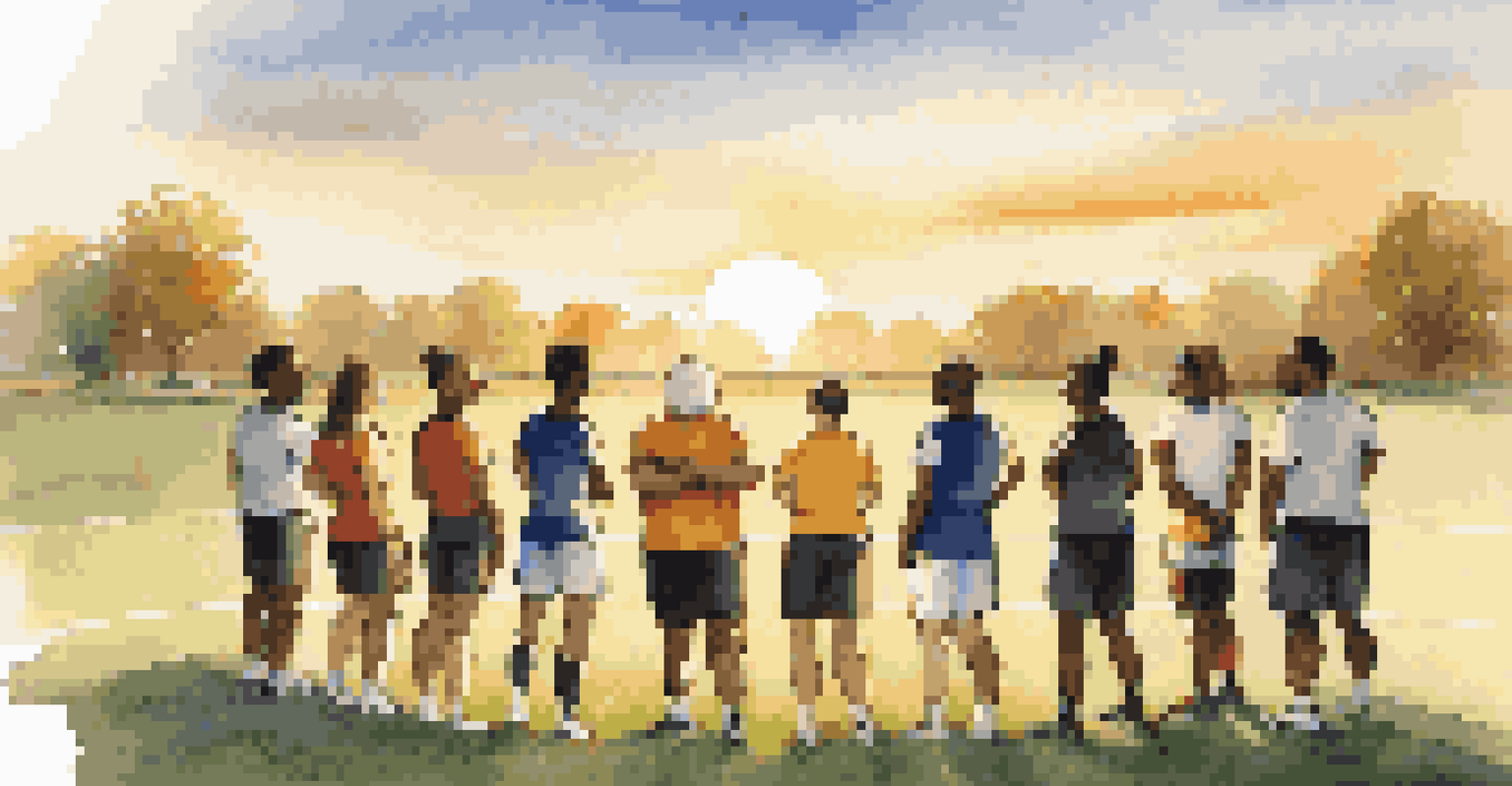Understanding the Role of Coaches in Athlete Rehabilitation

The Essential Role of Coaches in Rehabilitation
Coaches play a vital role in the rehabilitation process of athletes. They not only provide physical guidance but also emotional support during challenging times. This dual support is crucial, as rehabilitation can be a mentally taxing journey for athletes.
A coach is someone who can give correction without causing resentment.
By fostering a positive environment, coaches help athletes stay motivated and focused on their recovery goals. They understand the ups and downs that come with injuries, making it easier for athletes to express their fears and frustrations. This open communication can significantly enhance the rehabilitation experience.
In essence, coaches act as both trainers and cheerleaders, ensuring athletes feel supported and understood. Their involvement can make a big difference in how quickly and effectively an athlete returns to peak performance.
Creating Customized Rehabilitation Plans
Each athlete's injury is unique, requiring a tailored rehabilitation plan. Coaches collaborate with medical professionals to develop strategies that align with individual needs. This personalized approach ensures that athletes are not just following a generic program, but one that addresses their specific limitations and goals.

By understanding the athlete’s injury history and physical capabilities, coaches can design workouts that promote healing while avoiding further injury. This customized framework helps athletes regain strength, flexibility, and confidence in their abilities.
Coaches Provide Emotional Support
Coaches play a vital role in offering emotional guidance, helping athletes manage the mental challenges of rehabilitation.
Moreover, regular assessments and adjustments to these plans keep the rehabilitation process dynamic and responsive to progress. Coaches play an essential role in monitoring these changes, helping athletes stay on track throughout their recovery.
Fostering Mental Resilience during Recovery
Rehabilitation isn't just about physical recovery; it's also a mental battle. Coaches are instrumental in fostering mental resilience among athletes. They help athletes build a mindset that embraces challenges, encouraging them to view setbacks as opportunities for growth.
The greatest coach is not the one who tells you what to do, but the one who helps you realize what you can do.
Techniques such as visualization and goal-setting can be integrated into training sessions. Coaches often share personal anecdotes of overcoming adversity, which can inspire athletes to push through their own struggles. This shared experience helps create a bond that strengthens trust and teamwork.
Through consistent encouragement and positive reinforcement, coaches empower athletes to maintain a proactive attitude. This mental fortitude is crucial in ensuring athletes not only recover physically but also return to competition with confidence.
Building a Supportive Team Environment
A strong support system can significantly impact an athlete's rehabilitation journey. Coaches cultivate a team environment that promotes camaraderie and collective encouragement. When athletes see their teammates cheering them on, it helps alleviate feelings of isolation during recovery.
In practices, coaches may involve healthy athletes in the rehabilitation process, allowing them to participate and support their injured teammates. This approach not only boosts morale but also reinforces the idea that recovery is a shared journey.
Customized Plans for Recovery
Tailored rehabilitation plans created by coaches ensure athletes receive personalized care that addresses their unique needs.
Creating this supportive environment fosters a sense of belonging, encouraging athletes to stay committed to their rehabilitation goals. It reminds them that they are part of a larger community invested in their success.
Monitoring Progress and Adjusting Goals
Regular monitoring of an athlete's progress is essential for effective rehabilitation. Coaches track various metrics, such as strength, flexibility, and overall performance, to gauge recovery. This data-driven approach allows for informed decisions about when to ramp up training or adjust rehabilitation goals.
As athletes make progress, coaches celebrate milestones, no matter how small. This recognition reinforces a positive mindset and motivates athletes to keep pushing forward. Coaches also help athletes set realistic, achievable goals that align with their recovery timeline.
By adjusting goals as needed, coaches ensure that athletes remain engaged and challenged. This adaptability is crucial in maintaining momentum and fostering a sense of accomplishment throughout the rehabilitation process.
Educating Athletes on Injury Prevention
Injury rehabilitation isn't solely about recovery; it's also about prevention. Coaches take the opportunity to educate athletes on best practices for avoiding future injuries. This knowledge equips athletes with the tools they need to recognize potential risks and make informed choices.
Through discussions and training sessions, coaches highlight the importance of proper warm-ups, strength training, and body mechanics. They may also introduce injury prevention exercises tailored to individual sports, emphasizing their relevance.
Building Strong Coach-Athlete Bonds
A strong relationship between coaches and athletes fosters trust and open communication, which is crucial for successful recovery.
By instilling these preventive strategies, coaches empower athletes to take charge of their own health. This proactive approach not only enhances performance but also reduces the likelihood of setbacks in the future.
The Coach-Athlete Relationship: A Key to Success
The relationship between a coach and an athlete is foundational to successful rehabilitation. Trust and open communication are essential components that allow for honest discussions about progress and setbacks. When athletes feel comfortable expressing their concerns, it fosters a deeper connection and mutual respect.
Coaches who invest time in building this relationship often see better outcomes. They become more attuned to an athlete's needs and can provide tailored support that resonates on a personal level. This emotional connection can greatly enhance the overall rehabilitation experience.

Ultimately, a strong coach-athlete relationship creates a safe space for growth, allowing athletes to thrive during their recovery. This bond is not just about training; it's about cultivating resilience, trust, and shared goals.
Conclusion: The Impact of Coaches on Rehabilitation
In conclusion, coaches are pivotal figures in the rehabilitation of athletes. Their roles extend beyond physical training, encompassing emotional support, progress monitoring, and injury prevention education. This multifaceted approach ensures that athletes receive comprehensive care during their recovery journey.
As mentors and motivators, coaches foster an environment that encourages resilience and teamwork. Through their guidance, athletes not only recover but also learn valuable lessons that can be applied to future challenges.
The impact of a dedicated coach on an athlete's rehabilitation journey cannot be overstated. With their support, athletes can emerge stronger, both physically and mentally, ready to tackle whatever lies ahead in their athletic careers.